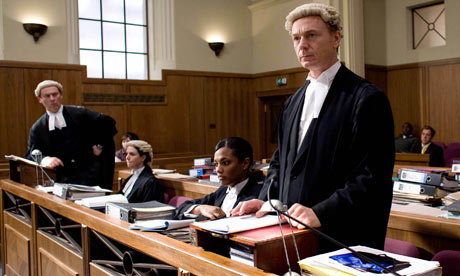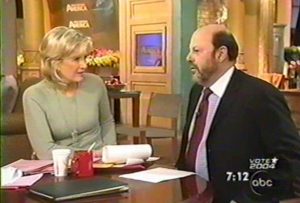The Police State Isn’t Just The Police. It’s The body politic. It’s those of us who get to sit on juries, and either condone or disapprove police actions. It’s the Judges and Justices who make the law (and don’t think for one second that it’s not all made up by the Courts). It’s Congress and state legislatures. It’s the media. It’s the politicians. It’s Hollywood. It’s any way and any form of shaping our belief system, to accept, as not only common or normal, but even as reasonable, what would have been considered police outrages and blatant violations of Constitutional rights not all that long ago. In the end, the police state is you; the voters and the jurors. It is what you tolerate; it’s what your concept of what’s reasonable, that, in the end, determines whether, and to what extent, we live in a police state or a free society. Those words often have little meaning for most of us; that is, until government abuse visits us, a friend, an associate or some loved one; something that most of us would have never expected at all.
Although any given government judicial, legislative or executive official make act otherwise as individuals, free from the dictates and pressures of their respective institutions and peers, when they act as police officers, judges and legislatures and even jurors, they act “institutionally”. Thus, politicians feel political pressure to act tough on crime, judges feel political pressure to find a way to convict / affirm the conviction of the accused, and the police feel pressured to make more and more arrests; often for victimless crimes, like drug possession.
These days, one of society’s major tool in establishing the police state, is the use of various “balancing tests”; to “balance” police intrusions and seizures of our and yours, against your long established Constitutional rights. The weight on the other pans of the justice scale, are today’s buzzword’s, such as “officer’s safety” and “national security”. Tomorrow, it will be some other justification for trampling your rights. The most blatant government efforts to violate your rights, however, are the immunities afforded those public officers, created by Judges and legislatures. Immunities don’t balance your rights; they simply erase them altogether; all in the name of “Sovereign Immunity”; “The King Can Do No Wrong”. In large part, immunities for police and prosecutorial officials have brought about today’s police state, and are essential to the maintenance of police oppression of society today.
SOVEREIGN IMMUNITY; PLACING THE GOVERNMENT ABOVE THE LAW.
Sovereign Immunity Is Inconsistent With A Basic Principle Of Our American Form Of Government: That No One, Not Even The Government, Is Above The Law.
Fidelity to the rule of law is the centerpiece of a free society. It means that no one is beneath the protection of the law and no one is absolved of the obligation to comply with it. The effect of sovereign immunity, however, is to place the government above the law and to ensure that many individuals who have suffered egregious harms by public officers will be unable to receive redress for their injuries. The judicial role of enforcing and upholding the Constitution is rendered illusory when the government has complete immunity to suit. Simply stated, sovereign immunity undermines the basic principle announced in Marbury v. Madison, 5 U.S. 137 (1803) that “[t]he very essence of civil liberty certainly consists in the right of every individual to claim the protection of the laws, whenever he receives an injury.”
ORIGINS OF THE DOCTRINE OF SOVEREIGN IMMUNITY; “THE KING CAN DO NO WRONG”.
English law began not from a position of general judicial liability for damages but from a position of very

limited liabilities that resulted in only nominal penalties. Moreover, the doctrine of judicial immunity was developed primarily to eliminate collateral attacks on judgments and to confine procedures in error to the hierarchy of the king’s courts; these grounds are relevant to discussions of judicial immunity today and are especially relevant to an analysis of Sparkman.
During the Reign of Edward I, those minimal immunities were expanded into what we recognize today as the “Doctrine of Sovereign Immunity“; that “the King can do no wrong.’” Since the time of Edward the First, the Crown of England has not been suable unless it has specifically consented to suit. Throughout American history, United States courts have applied this principle, although they often have admitted that its justification in this country is unclear.
A DOCTRINE DERIVED FROM THE PREMISE THAT “THE KING CAN DO NO WRONG” DESERVES NO PLACE IN AMERICAN LAW.
The United States was founded on a rejection of a monarchy and of royal prerogatives. American government is based on the fundamental recognition that the government and government officials can do wrong and must be held accountable. Sovereign immunity undermines that basic pillar of American justice. The doctrine of Sovereign Immunity is inconsistent with the United States Constitution. Nowhere does the Constitution or specifically mention or imply that the federal government has complete immunity to suit; save when it consents to be sued. Sovereign immunity cannot be found in the Constitution from an originalist perspective; even in the writing of the late Mr. Justice Antonin Scalia. See, Antonin Scalia, Historical Abnormalities in Administrative Law, in 1985 YEARBOOK 103, 104 (Supreme Court Historical Society):
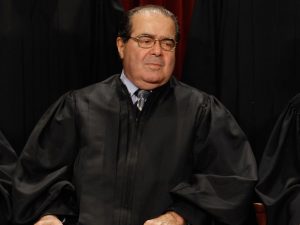
“At the time of Marbury v. Madison, 5 U.S. 137 (1803), there was no doctrine of domestic sovereign immunity, as there never had been in English law. As Marshall notes in passing in the portion of his opinion establishing the proposition that there is no right without a remedy: “In Great Britain, the king himself is sued in the respectful form of a petition, and he never fails to comply with the judgment of the court.” (Antonin Scalia, 1985).
Sovereign immunity is a doctrine based on a common law principle borrowed from the English common law. However, Article VI of the Constitution states that the Constitution and laws made pursuant to them are the supreme law, and, as such, it should prevail over government claims of sovereign immunity. Yet, sovereign immunity, a common lawdoctrine, trumps even the Constitution and bars suits for relief against government entities in violation of the Constitution and federal laws.”
Government accountability is inherent in the structure of the Constitution itself, and is embodied in various constitutional provisions. Long ago, in Marbury v. Madison, 5 U.S. 137 (1803), Chief Justice John Marshall explained that the central purpose of the Constitution is to limit the actions of government and government officers. In other words, the government is accountable for its actions. In Marbury, the Court emphasized the need for accountability and redress in its declaration that “[t]he very essence of civil liberty certainly consists in the right of every individual to claim the protection of the laws, whenever he receives an injury.” Chief Justice Marshall declared: “[t]he government of the United States has been emphatically termed a government of laws, and not of men.”
Sovereign immunity is inconsistent with all of these basic principles of the American republic. Sovereign immunity allows the government to violate the Constitution or laws of the United States without accountability. Constitutional and statutory rights can be violated, but individuals are left with no remedies:
“The very essence of civil liberty certainly consists in the right of every individual to claim the protection
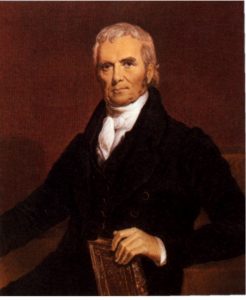
of the laws whenever he receives an injury. One of the first duties of government is to afford that protection. In Great Britain, the King himself is sued in the respectful form of a petition, and he never fails to comply with the judgment of his court.
In the third volume of his Commentaries, page 23, Blackstone states two cases in which a remedy is afforded by mere operation of law.
“In all other cases,” he says,
“it is a general and indisputable rule that where there is a legal right, there is also a legal remedy by suit or action at law whenever that right is invaded.”
And afterwards, page 109 of the same volume, he says,
“I am next to consider such injuries as are cognizable by the Courts of common law. And herein I shall for the present only remark that all possible injuries whatsoever that did not fall within the exclusive cognizance of either the ecclesiastical, military, or maritime tribunals are, for that very reason, within the cognizance of the common law courts of justice, for it is a settled and invariable principle in the laws of England that every right, when withheld, must have a remedy, and every injury its proper redress.”
The Government of the United States has been emphatically termed a government of laws, and not of men. It will certainly cease to deserve this high appellation if the laws furnish no remedy for the violation of a vested legal right.
If this obloquy is to be cast on the jurisprudence of our country, it must arise from the peculiar character of the case.
It behooves us, then, to inquire whether there be in its composition any ingredient which shall exempt from legal investigation or exclude the injured party from legal redress. In pursuing this inquiry, the first question which presents itself is whether this can be arranged with that class of cases which come under the description of damnum absque injuria – a loss without an injury.” Marbury v. Madison, 5 U.S. 137 (1803) (Marshall, C.J.).
Although the evil of failing to provide a remedy for violations of the rights of civilians for unlawful actions taken against them by government officials, is blatant and offensive to our American’s basic sense of justice, sovereign immunity is not fading from American law. Rather, the U.S. Supreme Court is dramatically expanding the scope of the evil shied of sovereign immunity.

This is so, even though there is no apparent Constitutional basis for sovereign immunity. See, Erwin Chemerinsky, Against Sovereign Immunity, 53 Stanford Law Review 1201, 1204 (2001). The supposedly “Originalist” / Anti-Judicial Activist / Conservative Wing of the Supreme Court has nonetheless been created new immunities for police, prosecutors and even judges; rapidly and out of thin air. Moreover, the Anti-Judicial Activist / Conservative Wing of the Supreme Court has recently enlarged and expanded a formidable barrier to redress for Constitutional violations by police officers and other public officials, by enlarging the reach of the constable’s go-to defense du jour; the doctrine of qualified immunity.
EXPANSION OF SOVEREIGN IMMUNITY TO PROTECT STATE GOVERNMENTS FROM FEDERAL LAWSUITS IN STATE COURTS.
In recent years, the Supreme Court has greatly expanded the sovereign immunity of state governments from suit on federal law claims in state courts, and of state and local officials federal court. For example, in Alden v. Maine, 527 U.S. 706 (1999), the Supreme Court held that sovereign immunity broadly protects state governments from being sued in state court without their consent, even to enforce federal laws. In Seminole Tribe v. Florida, 517 U.S. 44 (1996), the Court greatly limited the ability of Congress to authorize suits against state governments and to override sovereign immunity. The Court applied this principle within the past couple of years to bar suits against states for patent infringement and for age discrimination. Although all of these cases involve suits against state governments, the Court has indicated no willingness or likelihood of relaxing the sovereign immunity of the United States government.
EXPANSION OF SOVEREIGN IMMUNITY TO PROTECT LOCAL AND STATE OFFICIALS AND GOVERNMENTS FROM LAWSUITS; JUDICIAL ACTIVISM OF THE RIGHT
IMMUNITIES FOR FEDERAL CONSTITUTIONAL VIOLATIONS BY PUBLIC PROSECUTORS; ABSOLUTE PROSECUTORIAL IMMUNITY.
While federal law authorizes civil suits against government officers who violate constitutional and statutory rights (42 U.S.C. § 1983), the Supreme Court has insulated prosecutors against liability by holding that they are entitled to absolute immunity from civil damages for actions taken as advocates. Prosecutors may use false evidence, suppress exculpatory evidence, and elicit misleading testimony in probable cause hearings, without fear that they will be held personally liable, even if they intentionally and maliciously violate the rights of innocent people.
There is no place in American society for unchecked government power in a Constitutional Republic dedicated to the protection of individual freedom, and the human costs of prosecutorial impunity have proven staggering. There is compelling evidence that significant numbers of innocent people have been convicted and even sent to death row as a result of prosecutorial misconduct that virtually always goes unsanctioned and unpunished. Simply put, when prosecutors violate our rights, no judge-created rule should prevent them from being held civilly liable. That being said, the Supreme Court is not going to allow you to sue a public prosecutor, or someone carrying-on quasi-prosecutorial functions, no matter what they do to you, so long as what they did to you was in their role as an advocate for the government; a lawyer, or sometimes, even a Child Protective Services Worker.
Under the plain text of the Third Enforcement Act of 1871, 42 U.S.C. § 1983, any state actor who causes a
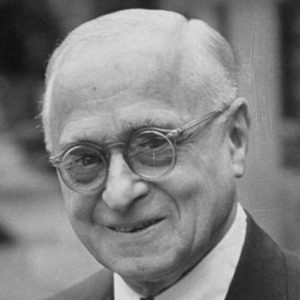
January 20, 1939 – August 28, 1962
citizen to be subjected to a violation of his/her constitutional rights can be sued. However, in Tenney v. Brandhove, 341 U.S. 367 (1951), Justice Frankfurter wrote: “We cannot believe that Congress … would impinge on [traditional immunities] so well grounded in history and reason by covert inclusion in the general language” of Section 1983.
In Monroe v. Pape, 365 U.S. 167 (1961), the opinion which gave birth to the revival of the Civil Rights Act of 1871 (The KKK Act of 1871), also known as the Third Enforcement Act), Justice William O. Douglas wrote for the Court that Section 1983 “should be read against the background of tort liability “.
The “background of tort liability,” Id. at 188, the Court noted in Pierson v. Ray, 386 U.S. 547 (1967) includes common law defenses. Id. at 554-55 (holding that some immunities were so “well established” at common law that Congress “would have specifically so provided had it wished to abolish” them.) Thus, if “‘an official was accorded immunity from tort actions at common law when the Civil Rights Act was enacted in 1871 [he will be entitled to immunity unless Section] 1983′s history or purposes nonetheless counsel against recognizing the same immunity in 1983 actions.’” Malley v. Briggs, 475 U.S. 335, 339-40 (1986) (quoting Tower v. Glover, 467 U.S. 914, 920 (1984)).
In Imbler v. Pachtman, 424 U. S. 409 (1976), the Court held that prosecutors performing core prosecutorial functions are entitled to absolute immunity:
“The question presented in this case is whether a state prosecuting attorney who acted within the scope
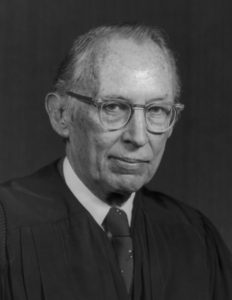
of his duties in initiating and pursuing a criminal prosecution is amenable to suit under 42 U.S.C. § 1983 for alleged deprivations of the defendant’s constitutional rights. The Court of Appeals for the Ninth Circuit held that he is not. 500 F.2d 1301. We affirm . . .
. . . The office of public prosecutor is one which must be administered with courage and independence. Yet how can this be if the prosecutor is made subject to suit by those whom he accuses and fails to convict? To allow this would open the way for unlimited harassment and embarrassment of the most conscientious officials by those who would profit thereby. There would be involved in every case the possible consequences of a failure to obtain a conviction.
There would always be a question of possible civil action in case the prosecutor saw fit to move dismissal of the case. . . . The apprellension of such consequences would tend toward great uneasiness and toward weakening the fearless and impartial policy which should characterize the administration of this office. The work of the prosecutor would thus be impeded, and we would have moved away from the desired objective of stricter and fairer law enforcement.” Pearson v. Reed, 6 Cal.App.2d 277, 287, 44 P.2d 592, 597 (1935) See also Yaselli v: Goff, 12 F.2d at 404-406.
The common law rule of immunity is thus well settled.We now must determine whether the same considerations of public policy that underlie the common law rule likewise countenance absolute immunity under § 1983. We think they do.
If a prosecutor had only a qualified immunity, the threat of § 1983 suits would undermine performance of his duties no less than would the threat of common law suits for malicious prosecution. A prosecutor is duty bound to exercise his best judgment both in deciding which suits to bring and in conducting them in court. The public trust of the prosecutor’s office would suffer if he were constrained in making every decision by the consequences in terms of his own potential liability in a suit for damages. Such suits could be expected with some frequency, for a defendant often will transform his resentment at being prosecuted into the ascription of improper and malicious actions to the State’s advocate. Cf. Bradley v. Fisher, 13 Wall. at 80 U. S. 348;Pierson v. Ray, 386 U.S. at 386 U. S. 554. Further, if the prosecutor could be made to answer in court each time such a person charged him with wrongdoing, his energy and attention would be diverted from the pressing duty of enforcing the criminal law.
Moreover, suits that survived the pleadings would pose substantial danger of liability even to the honest prosecutor. The prosecutor’s possible knowledge of a witness’ falsehoods, the materiality of evidence not revealed to the defense, the propriety of a closing argument, and — ultimately in every case — the likelihood that prosecutorial misconduct so infected a trial as to deny due process, are typical of issues with which judges struggle in actions for post-trial relief, sometimes to differing conclusions. The presentation of such issues in a § 1983 action often would require a virtual retrial of the criminal offense in a new forum, and the resolution of some technical issues by the lay jury. It is fair to say, we think, that the honest prosecutor would face greater difficulty in meeting the standards of qualified immunity than other executive or administrative officials. Frequently acting under serious constraints of time and even information, a prosecutor inevitably makes many decisions that could engender colorable claims of constitutional deprivation. Defending these decisions, often years after they were made, could impose unique and intolerable burdens upon a prosecutor responsible annually for hundreds of indictments and triais. Cf. Bradley v. Fisher, supra at80 U. S. 349.
The affording of only a qualified immunity to the prosecutor also could have an adverse effect upon the functioning of the criminal justice system. Attaining the system’s goal of accurately determining guilt or innocence requires that both the prosecution and the defense have wide discretion in the conduct of the trial and the presentation of evidence. [Footnote 23] The veracity of witnesses in criminal cases frequently is subject to doubt before and after they testify, as is illustrated by the history of this case. If prosecutors were hampered in exercising their judgment as to the use of such witnesses by concern about resulting personal liability, the triers of fact in criminal cases often would be denied relevant evidence.
The ultimate fairness of the operation of the system itself could be weakened by subjecting prosecutors to § 1983 liability. Various post-trial procedures are available to determine whether an accused has received a fair trial. These procedures include the remedial powers of the trial judge, appellate review, and state and federal post-conviction collateral remedies. In all of these, the attention of the reviewing judge or tribunal is focused primarily on whether there was a fair trial under law. This focus should not be blurred by even the subconscious knowledge that a post-trial decision in favor of the accused might result in the prosecutor’s being called upon to respond in damages for his error or mistaken judgment. [Footnote 25]
We conclude that the considerations outlined above dictate the same absolute immunity under § 1983 that the prosecutor enjoys at common law. To be sure, this immunity does leave the genuinely wronged defendant without civil redress against a 2prosecutor whose malicious or dishonest action deprives him of liberty. But the alternative of qualifying a prosecutor’s immunity would disserve the broader public interest. It would prevent the vigorous and fearless performance of the prosecutor’s duty that is essential to the proper functioning of the criminal justice system. [Footnote 26] Moreover, it often would prejudice defendants in criminal cases by skewing post-conviction judicial decisions that should be made with the sole purpose of insuring justice. With the issue thus framed, we find ourselves in agreement with Judge Learned Hand, who wrote of the prosecutor’s immunity from actions for malicious prosecution.” (Powell, J.).
NOT ALL ACTIONS OF A PUBLIC PROSECUTOR ARE IMMUNE FROM LIABILITY; THE FUNCTIONAL TEST.
Prosecutorial immunity does not apply to all prosecutorial conduct. Rather, the reviewing court looks to “the nature of the function performed, not the identity of the actor who performed it.” Forrester v. White, 484 U. S. 219, 229 (1988). This is called the “functional test” to immunities.
When a prosecutor acts as a lawyer, as an “advocative” for the government, that is, he “act[s] within the scope of his duties in initiating and pursuing a criminal prosecution,” Imbler v. Pachtman, 424 U. S. 409, 410 (1976), he is absolutely immune from suit. It’s a matter of first principle that a prosecutor is not entitled to absolute immunity unless he is performing an “advocative” function. In Imbler v. Pachtman, 424 U. S. 409, 430-431 (1976), the Supreme Court noted the significant difference between “those aspects of the prosecutor’s responsibility that cast him in the role of an administrator or investigative officer rather than that of advocate [ ].” Thus, in Burns v. Reed, 500 U.S. 478 (1991) the Supreme Court held that prosecutors were absolutely immune for conduct associated with presenting evidence before a grand jury, but not for rights violations flowing from legal advice they gave to police officers. Giving legal advice to police officers (in this case, telling them that hypnotizing a witness was constitutional), was not advocative conduct. Id. at 492-96.
Thereafter, in Buckley v. Fitzsimmons, 509 U.S. 259 (1993), the Supreme Court held that a prosecutor was not absolutely immune for false statements made in a press conference, and for other pre-trial investigative conduct. The Fitzsimmons court noted that “[t]he conduct of a press conference does not involve the initiation of a prosecution, the presentation of the state’s case in court, or actions preparatory for these functions.” Id. at 278. Thus, even though “[s]tatements to the press may be an integral part of a prosecutor’s job,” id. at 278 and “may serve a vital public function … a prosecutor is in no different position than other executive officials who deal with the press, and, as noted above, qualified immunity is the norm for them.” Id. (citations omitted).
More recently, in Kalina v. Fletcher, 522 U.S. 118 (1997), a unanimous Supreme Court held that a prosecutor who perjured herself when certifying certain facts necessary to obtain an arrest warrant was not absolutely immune from suit. Applying the functional approach to immunities, i.e., looking to “the nature of the function performed, not the identity of the actor who performed it,” Forrester v. White, 484 U. S. 219, 229 (1988), the Court asked “whether the prosecutor was acting as a complaining witness rather than a lawyer when she executed the certification [ ].” Id. at 129. The Court rejected the prosecutor’s argument “that the execution of the certificate was just one incident in a presentation that, viewed as a whole, was the work of an advocate and was integral to the initiation of the prosecution.” Id. at 130. Because “[t]estifying about facts is the function of the witness, not of the lawyer,” the prosecutor was not entitled to absolute immunity.
Supreme Court precedent thus clearly establishes that a prosecutor is not entitled to absolute immunity unless he is performing advocative conduct. The challenge is distinguishing between “those aspects of the prosecutor’s responsibility that cast him in the role of an administrator or investigative officer rather than that of advocate[ ].” Imbler v. Pachtman, 424 U.S. at 430-31 (1976).
The “Advocative” Function.
“Advocative” conduct includes that which is “intimately associated with the judicial phase of the criminal process. Imbler v. Pachtman, 424 U. S. 409, 430-431 (1976). In Bernard v. County of Suffolk, 356 F.3d 495, 503 (2d Cir. 2004) a unanimous three-judge panel wrote that advocative conduct is that which “lie[s] at the very core of a prosecutor’s role as an advocate engaged in the judicial phase of the criminal process.” These “core” “Advocative”functions of a prosecutor include:
- The filing of criminal charges, Imbler v. Pachtman, 424 U. S. 409, 430-431 (1976); Pinaud v. County of Suffolk, 52 F.3d 1139 (2d Cir. 1995), even when done in bad faith. Shmueli v. New York, No. 03-0287 (2d Cir. Sept. 15, 2005);
- The presenting of evidence before a grand jury, Hill v. City of New York, 45 F.3d 653 (2d Cir. 1995);
- Advocacy at a preliminary hearing, Burns v. Reed, 500 U.S. 478 (1991);
- Accepting a plea bargain, Taylor v. Kavanagh, 640 F.2d 450 (2d Cir. 1981);
- Retaining evidence pending a direct appeal, Parkinson v. Cozzolino, 238 F.3d 148 (2d Cir. 2001);
- Advocating increased bail at a bail hearing, Pinuad v. County of Suffolk, 52 F.3d 1139 (2d Cir. 1995).
The “Impermissibly Intertwined” And Lack Of Jurisdiction Exceptions.
Even if a prosecutor is performing an advocative function, he will nonetheless be denied absolute immunity if he intertwines the exercise of his advocation function with impermissible conduct; or if he acts in excess of his statutorily-conferred jurisdiction.
Thus, absolute immunity will not shield him if he “has intertwined his exercise of prosecutorial discretion with other, unauthorized conduct.” Bernard v. County of Suffolk, 356 F.3d 495, 504 (2004). A prosecutor also does not have absolute immunity “for acts that are manifestly or palpably beyond his authority” or are “performed in the clear absence of all jurisdiction.” Schloss v. Bouse, 876 F.2d 287, 291 (2d Cir. 1989). To determine whether a prosecutor has authority to take some act, “a court will begin by considering whether relevant statutes authorize prosecution for the charged conduct.” Bernard v. County of Suffolk, 356 F.3d 495, 504 (2004) (holding that prosecutor engaging in an allegedly politically-motivated prosecution was nonetheless entitled to absolute immunity, since the decision to file charges was a prosecutorial function).
“For example, where a prosecutor has linked his authorized discretion … to an unauthorized demand for a bribe, sexual favors, or the defendant’s performance of a religious act, absolute immunity will be denied.” Id. at 504 (citing Doe v. Phillips, 81 F.3d 1204 (2d Cir. 1996). The most prominent (and perhaps one of the only published Second Circuit opinions applying the impermissibly intertwined doctrine) is Doe v. Phillips, 81 F.3d 1204 (2d Cir. 1996).
In Doe, a state prosecutor, Gerald D’Amelia filed felony charges against a mother for allegedly molesting her 14-year old son. Id. at 1206. After beginning to doubt the boy’s accusations, the prosecutor agreed to dismiss the charges. But only on one condition. Doe, a Roman Catholic, was required to swear on the Bible that the son’s accusations were false. Id. at 1207 (“D’Amelia testified that he told counsel that [unless Doe swore on the Bible] criminal charges would not be dismissed against her [ ].”)
The panel held that even though accepting and demand a plea bargain is an advocative function, Taylor v. Kavanagh, 640 F.2d 450 (2d Cir. 1981), the prosecutor was not absolutely immune since he lacked authority to demand that Doe swear on the Bible. Because he lacked authority to demand this “intertwined conduct,” D’Amelia was not absolutely immune from suit. Id. at 1211. (“D’Amelia’s conduct was not protected by absolute immunity because his demand that Doe swear to her innocence on a bible in church was manifestly beyond his authority.”)
In sum, Prosecutorial Immunity, an atextual and judicially-created doctrine, shields advocative conduct from suit. Whether or not the prosecutor acted with bad faith or ill will matters not. The challenge, then, is differentiating between “advocative,” “administrative,” and “investigatory” functions. It is also worth noting that even if a prosecutor is denied absolute immunity, she might still be entitled to qualified immunity.
So, the next time that a Deputy District Attorney attempts to convict you for a crime that you’re innocent of, just to protect the police officer who falsely arrested you, just remember, The D.A. Can Do No Wrong.
If you have questions about malicious criminal prosecutions and whether you have a viable malicious prosecution case, please contact the Law Office of Jerry L. Steering for a free telephone consultation.
Good luck,
Jerry L. Steering, Esq.
Published: 2/5/2019

